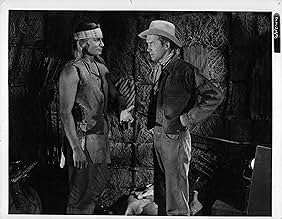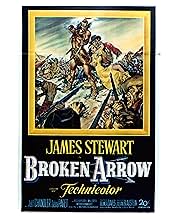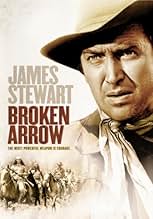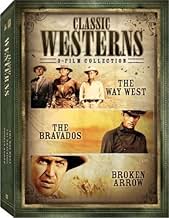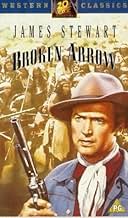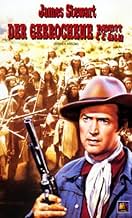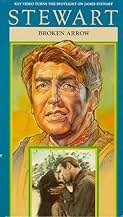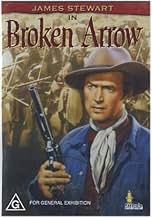IMDb RATING
7.1/10
10K
YOUR RATING
Tom Jeffords tries to make peace between settlers and Apaches in Arizona territory.Tom Jeffords tries to make peace between settlers and Apaches in Arizona territory.Tom Jeffords tries to make peace between settlers and Apaches in Arizona territory.
- Director
- Writers
- Stars
- Nominated for 3 Oscars
- 4 wins & 6 nominations total
Joyce Mackenzie
- Terry
- (as Joyce MacKenzie)
Robert Adler
- Lonergan - Stage Driver
- (uncredited)
Trevor Bardette
- Stage Passenger
- (uncredited)
Chris Willow Bird
- Nochalo
- (uncredited)
Raymond Bramley
- Col. Bernall
- (uncredited)
Chet Brandenburg
- Miner
- (uncredited)
Argentina Brunetti
- Nalikadeya - Cochise's Wife
- (uncredited)
Harry Carter
- Miner
- (uncredited)
Iron Eyes Cody
- Teese
- (uncredited)
J.W. Cody
- Pionsenay - Chosen Warrior
- (uncredited)
Heinie Conklin
- Townsman
- (uncredited)
Dolores Christine Cypert
- American Indian
- (uncredited)
- …
- Director
- Writers
- All cast & crew
- Production, box office & more at IMDbPro
Featured reviews
Although the story is entertaining and the performances of James Stewart, Jeff Chandler and Debra Paget outstanding, what makes Broken Arrow a landmark film is its portrayal of the Apache Indians as something more than savage killers. Indians in the movies were always seen as brutal and inhuman. Here they are seen as people who want what the "white men" wanted: to live in freedom with their families on their own land and to live their lives in their own way.
Jeff Chandler is terrific as Apache leader Cochise, who he would play twice more in other films. There is a moving scene when they return from battle and he recites the names of those killed with a pained look in his eyes. Cochise and Stewart's character have a relationship which grows from mutual respect to a true friendship as they try to work out peace between the whites and indians. Stewart is looked on as a traitor by his friends and things are complicated further by his relationship with the young Apache girl played by Debra Paget.
I cannot think of another western in which indians have been portrayed as real people with emotions who hurt, who love. When this film was released 50 years ago, blacks, asians and American Indians were still being portrayed using the worst kinds of racial stereotypes.
Jeff Chandler is terrific as Apache leader Cochise, who he would play twice more in other films. There is a moving scene when they return from battle and he recites the names of those killed with a pained look in his eyes. Cochise and Stewart's character have a relationship which grows from mutual respect to a true friendship as they try to work out peace between the whites and indians. Stewart is looked on as a traitor by his friends and things are complicated further by his relationship with the young Apache girl played by Debra Paget.
I cannot think of another western in which indians have been portrayed as real people with emotions who hurt, who love. When this film was released 50 years ago, blacks, asians and American Indians were still being portrayed using the worst kinds of racial stereotypes.
In this underrated Western, Stewart is an ex-scout who tries to make peace between the Apaches and the white settlers in 1870s Arizona. For some reason this film's reputation has taken a hit over the years, but it is quite enjoyable. Stewart made several Westerns in the 1950s, starting with this and "Winchester 73" in 1950. Although the latter film is more highly regarded today, this film is actually better crafted, boasting fine cinematography and score. Chandler gives perhaps the best performance of his career as the noble Apache chief who is willing to make peace. Paget (looking like Britney Spears!) plays Stewart's love interest.
Released in 1950 and directed by Delmer Daves, "Broken Arrow" stars Jimmy Stewart as a former soldier, Tom Jeffords, who saves an Apache teen after ten years of war between settlers and Natives in 1870, Arizona. When the boy's elders extend him mercy Jeffords sees the Apaches as human beings rather than faceless enemies for the first time and becomes the mediator between the warring factions. Jeff Chandler is stunning as the Apache leader, Cochise, but Debra Paget, only 16 years-old during filming, looks too whitebread to be believable. I love Debra, but casting her in this role is eye-rolling. To the film's credit, several of the peripheral Apache characters are played by Native Americans, including Jay Silverheels and John War Eagle.
The emphasis is on the Apache way of life and the movie is touted as the first pro-Indian Western ("pro-Indian" to a point), but this simply isn't the case. "Buffalo Bill" with Joel McCrea came out six years earlier and it was clearly favorable toward the Natives. "Broken Arrow" just goes a little further in this direction. Regardless, it is amazing to view Westerns from this long ago that are evenhanded regarding the Indian Wars, honestly portraying the Natives as hostile and formidable, but also with respect to their perspective and way of life. While obviously dated in some respects, both "Buffalo Bill" and "Broken Arrow" stand the test of time and remain entertaining and even enlightening to this day.
The movie runs 93 minutes and was shot in Arizona, but also Iversion Ranch & Alabama Hills, California.
GRADE: B+ or A-
The emphasis is on the Apache way of life and the movie is touted as the first pro-Indian Western ("pro-Indian" to a point), but this simply isn't the case. "Buffalo Bill" with Joel McCrea came out six years earlier and it was clearly favorable toward the Natives. "Broken Arrow" just goes a little further in this direction. Regardless, it is amazing to view Westerns from this long ago that are evenhanded regarding the Indian Wars, honestly portraying the Natives as hostile and formidable, but also with respect to their perspective and way of life. While obviously dated in some respects, both "Buffalo Bill" and "Broken Arrow" stand the test of time and remain entertaining and even enlightening to this day.
The movie runs 93 minutes and was shot in Arizona, but also Iversion Ranch & Alabama Hills, California.
GRADE: B+ or A-
Tagline: Of this motion picture the screen can be proud... Today... Tomorrow... A generation from now...
Worth repeating this tagline, because after seeing the film again for the first time in 42 years, it's right on. 50s westerns almost universally depicted Indians as pigeon-English speaking savages... or tried to talk Indian that translated to pigeon-Indian.
While the leading cast is all-Anglo, the perspective is that both sides in the Wild West were had more than a few intelligent, caring individuals among them. A willingness to sacrifice much (including renegades) to achieve a lasting peace is the message.
Jimmy Stewart had something to lose by doing a picture like this, but the acting here stands with any in his career. The portrayal of Cochise by Jeff Chandler is powerful, although unquestionably a little bit too noble-savagish.
"Let's mosey on over there" is a line spoken by Stewart toward the end of the film. Takes you back to a time when people took time to mosey.
A good-hearted picture by a little-known director standing up against the prevailing stereotypes. Wouldn't be surprised if Costner watched it more than once before making "Dances with Wolves".
Worth repeating this tagline, because after seeing the film again for the first time in 42 years, it's right on. 50s westerns almost universally depicted Indians as pigeon-English speaking savages... or tried to talk Indian that translated to pigeon-Indian.
While the leading cast is all-Anglo, the perspective is that both sides in the Wild West were had more than a few intelligent, caring individuals among them. A willingness to sacrifice much (including renegades) to achieve a lasting peace is the message.
Jimmy Stewart had something to lose by doing a picture like this, but the acting here stands with any in his career. The portrayal of Cochise by Jeff Chandler is powerful, although unquestionably a little bit too noble-savagish.
"Let's mosey on over there" is a line spoken by Stewart toward the end of the film. Takes you back to a time when people took time to mosey.
A good-hearted picture by a little-known director standing up against the prevailing stereotypes. Wouldn't be surprised if Costner watched it more than once before making "Dances with Wolves".
When I was a young boy I saw this picture. It was the first western in which the Indians were not uncivilised barbarians, but normal people, with their own standards. It was a revelation! At last one director had the courage to show this to us. So thank you, Delmer Daves! The performances of Jeff Chandler and James Steward were touching and also Debra Paget was fantastic. I do hope to see this film again someday on DVD. Hans Dullaart Delft Netherlands.
Did you know
- TriviaThe broken arrow, which signals an end to fighting, is in fact a Blackfoot Indian symbol, not an Apache symbol. The Blackfoot are native to Montana and Alberta, Canada.
- GoofsWhen General Howard is beginning to pick himself off the ground after the Apache attack on the military wagon train, the first shot shows the ground to be mostly desert sand, with very little vegetation, but when the scene jumps to a long shot of the General getting up, the ground around him is almost entirely covered with green vegetation, showing scarcely any sand at all.
- ConnectionsFeatured in Family Classics: Family Classics: Broken Arrow (1963)
- How long is Broken Arrow?Powered by Alexa
Details
Box office
- Gross worldwide
- $10,145
- Runtime
- 1h 33m(93 min)
- Aspect ratio
- 1.37 : 1
Contribute to this page
Suggest an edit or add missing content


